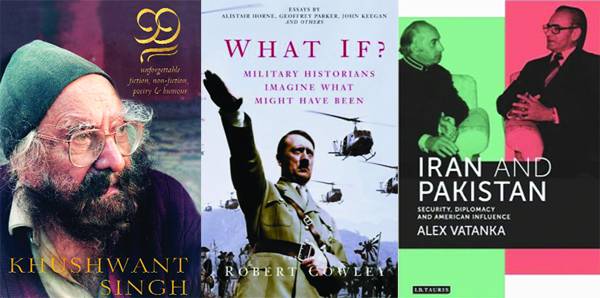
99: Unforgettable Fiction, Non-Fiction, Poetry and Humour
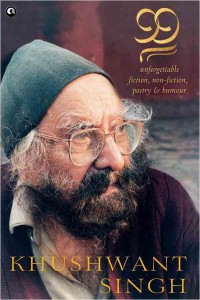
Khushwant Singh
Aleph Book Company, 2014
PRs 1,395
99: Unforgettable Fiction, Non-Fiction, Poetry and Humour is a tribute to one of the most eminent and distinguished Indian novelists, the late Khushwant Singh. The book was published to mark his 99th birthday – a year before he passed away. It is a compilation of his life’s work and includes essays, stories and poems, each symbolising a year of his life. The works are selected for their quality, but they also stand for the adaptability of the author, covering as they do a diverse range of topics on life and society.
Among the book’s 15 segments, “Family Matters” contains excerpts from his autobiography and personal descriptions of and by the writer. Singh writes elegantly about his motherland in “My Beloved Country”. “The Sikhs” contains narrations from his works A History of the Sikhs and Ranjit Singh. “The Uses and Abuses of Religion” includes a set of articles that pinpoint the deep roots of religion in Indian society and its flaws. “A Passage to Pakistan” showcases the tragedy of Partition and contains Singh’s well-known article, “The Hanging of Bhutto”. “All About Sex” incorporates the author’s liberal and unorthodox views on sex and women. His humorous writings are contained in “A Merry Heart” and “Enthusiasms, Rants and Soliloquies” includes a diverse range of poems.
Because We Say So
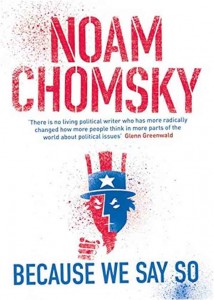
Noam Chomsky
Hamish Hamilton, 2015
PRs 1,045
Because We Say So is Noam Chomsky’s essential counter-punch to American hegemony. In 1962, the eminent statesman Dean Acheson enunciated a principle that has dominated global politics ever since: that no legal issue arises when the United States responds to a challenge to its “power, position, and prestige”. In short, whatever the world may think, US actions are legitimate because they say so.
Spanning the impact of Edward Snowden’s whistleblowing and Palestinian-Israeli relations to deeper reflections on political philosophy and the importance of a commons to democracy, Because We Say So takes American imperialism head on. “Noam Chomsky is one of a small band of individuals fighting a whole industry. And that makes him not only brilliant, but heroic” (Arundhati Roy).
When the Moon Is Low: A Novel
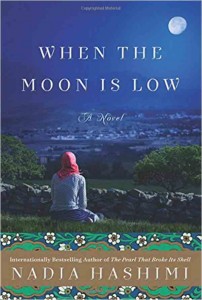
Nadia Hashimi
William Morrow, 2015
PRs 995
Mahmoud’s passion for his wife Fereiba, a schoolteacher, is greater than any love she has ever known. But their happy, middle-class world – a life of education, work and comfort – implodes when their country is engulfed in war and the Taliban rise to power. Mahmoud, a civil engineer, becomes a target of the new fundamentalist regime and is murdered. Forced to flee Kabul with her three children, Fereiba has one hope of survival: she must find a way to cross Europe and reach her sister’s family in England. With forged papers and help from kind strangers they meet along the way, they make a dangerous crossing into Iran under cover of darkness. Exhausted and broken-hearted but undefeated, Fereiba manages to smuggle them as far as Greece. But in a busy market square, their fate takes a frightening turn when her teenage son, Saleem, becomes separated from the rest of the family.
Faced with an impossible choice, Fereiba pushes on with her daughter and baby, while Saleem falls into the shadowy underground network of undocumented Afghans who haunt the streets of Europe’s capitals. Across the continent, Fereiba and Saleem struggle to reunite and ultimately find a place where they can begin to reconstruct their lives.
EDITOR’S PICK
What If? Military Historians Imagine What Might Have Been
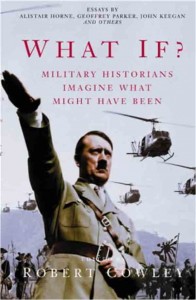
Ed. Robert Cowley
Pan Books, 2001
PRs 750
Counterfactuals – what-if scenarios – fuelled countless bull sessions in smoke-filled dorm rooms in the 1960s. What if Sitting Bull had had a machine gun at Little Big Horn? What if Attila the Hun had had a time machine? What if Columbus had landed in India after all? Some of those dorm-room speculators grew up to be historians, and their generation (along with a few younger and older scholars) makes a strong showing in this anthology of essays, in which the what-ifs are substantially more plausible.
What if Hitler had not attacked Russia when he did? He might have moved into the Middle East and secured the oil supplies the Third Reich so badly needed, helping it retain its power in Europe. What if D-Day had been a failure? The Soviet Union might have controlled all of Europe. What if Sennacherib had pressed the siege of Jerusalem in 701 BC? Then the nascent, monotheistic Jewish religion might never have taken hold among the people of Judah and the daughter religions of Christianity and Islam may never have been born.
Concentrating on some of the most intriguing military history turning points of the last 3,000 years, twenty celebrated historians, including Alistair Horne and John Keegan, have come together to produce a group of essays that enhance our current understanding of decisive events.
What people are saying: “Pure, almost illicit pleasure. What makes these essays tremendously diverting is how little they strain one’s sense of credibility” (Sunday Telegraph).
Iran and Pakistan: Security, Diplomacy and American Influence
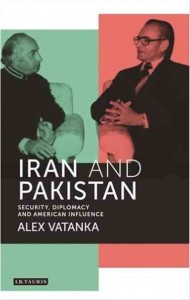
Alex Vatanka
I B Tauris, 2015
PRs 11,695
The respective policies of the governments of Iran and Pakistan pose serious challenges to US interests in the Middle East, Asia and beyond. These two regional powers, with a combined population of around 300 million, have been historically intertwined in various cultural, religious and political ways. Iran was the first country to recognise the emerging independent state of Pakistan in 1947 and the Shah of Iran was the first head of state to visit the new nation. While this relationship shifted following the 1979 Iranian Revolution, and tensions do exist between Sunni Pakistan and Shi‘a Iran, there has nevertheless been a history of cooperation between the two countries in fields that are of great strategic interest to the US: Afghanistan, nuclear proliferation and terrorism. Yet much of this history of cooperation, conflict and ongoing interactions remains unexplored. Alex Vatanka here presents the first comprehensive analysis of this long-standing and complex relationship.
What people are saying: “In tracing the course of Iranian-Pakistani taut relations over nearly seven decades, Vantanka’s lively, thoroughly researched book threads together those personalities and events that have shaped two of the most challenging countries faced today by Western policymakers. The book provides for a sound understanding of areas of foreign policy and regional and global alliances that once figured so prominently in the Cold War and now in the fight against global militant extremism. Shia-Sunni rivalry, regional nuclear proliferation and the American dimension are also illuminated by this book’s wide-ranging, engrossing narrative” (Marvin Weinbaum, Director of the Pakistan Center at the Middle East Institute, Washington DC).

